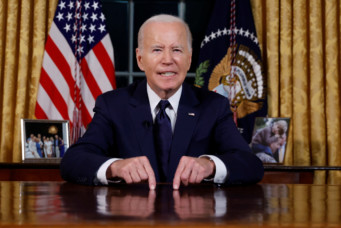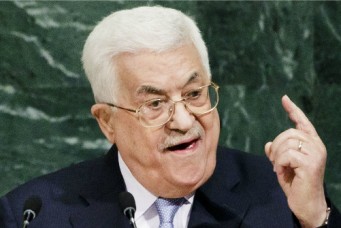Peace Needs a New Balfour Declaration—A “Biden Declaration”
U.S. President Joe Biden should issue a declaration spelling out a one-year plan that would end with launching negotiations for the establishment of an independent and viable Palestinian State.
As two retired ambassadors, an Egyptian and an Israeli, who spent the last four decades of our lives trying to serve our respective countries’ national interests through diplomacy, we both agree with the majority of Arabs and Israelis that there is no military solution for the Israeli-Palestinian conflict. The current catastrophic war in Gaza provides clear evidence to support our conviction. The Egyptian-Israeli peace experience, on the other hand, shows us an alternative route ahead to reconcile the attainment of Palestinian national rights with Israeli security demands.
The war in Gaza continues in full force since the horrific attack by Hamas on October 7 that killed hundreds of Israeli civilians, and the relentless Israeli air bombardment and ground military operations which created a dire humanitarian crisis in the Strip and killed thousands of Palestinian civilians.
Contrary to the public claims of each side, no clear victory can be attained or accurately defined. Short and temporary pauses in the fighting can only temporarily mitigate the Palestinian humanitarian disaster in Gaza; these pauses are merely partial solutions to eliminate security threats against Israelis, or to release the hostages and prisoners of war.
We would like to advocate for a long-term package deal that would save innocent lives on both sides, create hope for a political horizon for the Palestinians, and guarantee Israel’s security. It would require a leading U.S. role to make up for the absence of political readiness on both sides to conclude this historic deal today.
U.S. President Joe Biden could make a declaration, similar to the Balfour declaration—a “Biden Declaration” if you will—in which he would spell out a one-year plan that would end with launching negotiations for the establishment (in phased implementation) of an independent and viable Palestinian State based on the territories occupied by Israel in 1967, and with equitable security guarantees.
This American declaration should open the way for Palestine to be accepted as a full member-state of the United Nations and other international organizations. The United States could also push a resolution to be adopted by the UN Security Council to endorse the final settlement’s parameters contained in that declaration.
The one-year transitional period to end the war in Gaza should include the release of all hostages and prisoners of war on both sides, an invitation for the PLO/PA to form a governing body in Gaza, and the deployment of an international peace-keeping force. This force would supervise Israeli military withdrawal from Gaza and the destruction of all heavy weapons in the strip, and would monitor all its imports and exports. A global campaign would be launched to rebuild Gaza and transform it into a flourishing economic example of regional and international peaceful cooperation.
This plan would create the missing political hope for the Palestinians and achieve the security aspirations of the Israeli people. Turning Gaza into a promising model for a future Palestinian-Israeli peace would also accomplish many other strategic objectives.
Such an outcome would help prevent a political and security vacuum in the Gaza Strip, which on the one hand would make it difficult for Israel to leave the territory and on the other, could foment the growth of radical elements in the Strip.
This plan would also help to ensure humanitarian aid to the civilians in the Gaza Strip. There is interest in disarming the militants; there is no intention, however, to do that at the cost of creating a humanitarian crisis.
In addition, this arrangement would serve to preserve regional stability, with particular focus on Israel’s peace agreements with Egypt and Jordan. It is essential to preserve the Abraham Accords, and the regional thawing process, including the possibility of a normalization process with Saudi Arabia. This would contribute substantially to a future peace between Israel and the Palestinians, not only in Gaza but also in the West Bank and Jerusalem as well.
Avoiding the possible escalation of the current war to include other regional and international players such as Iran, the U.S. and Russia, is also another important factor to motivate the international community to work on a just and secure peace rather than going back to the status quo before the war in Gaza.
Only radicals on both sides would benefit from going back to the status-quo-ante before October 7. Israel’s military control and occupation of millions of Palestinians on their land would never guarantee its security or make it a democratic civilized state. As the Egyptian-Israeli peace experience has clearly proved for over 40 years, peace is the ultimate guarantor of security. It also opens the way for Israel to be fully integrated in its immediate neighborhood and to become a major participant in regional economic, cultural, and defense projects. Peace would empower moderates on both sides and enable them to show their people the benefits of stability, cooperation, and growth.
Under the present dire circumstances of war and bloodshed, our ideas might sound to many as overly optimistic. All grand visions of peace initially, appeared impossible to attain. They materialized only when adopted by peace advocates on both sides of the conflict and with support from the dominant global powers.
The global community should participate in the needed hard work to create a political horizon for the Palestinians and Israelis to peacefully coexist, to invest in turning this horizon into a reality, and to overcome the militants’ opposition on both sides. We remain convinced that the majority of Arabs, Israelis, and the rest of the civilized world would make the right choice for peace to prevail.
Read More




